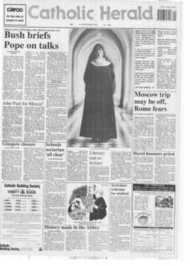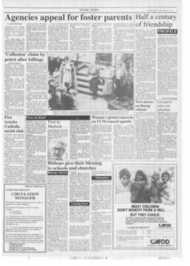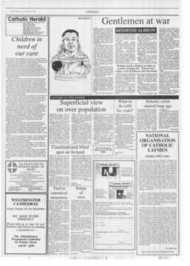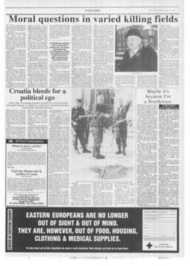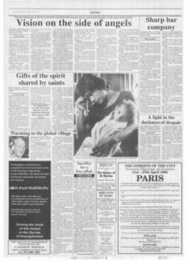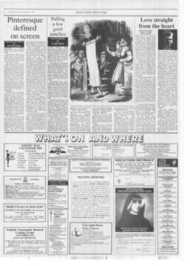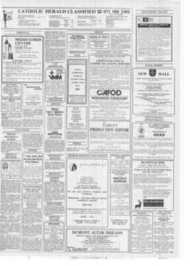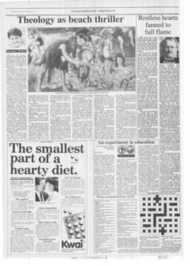Page 7, 1st November 1991
Page 7
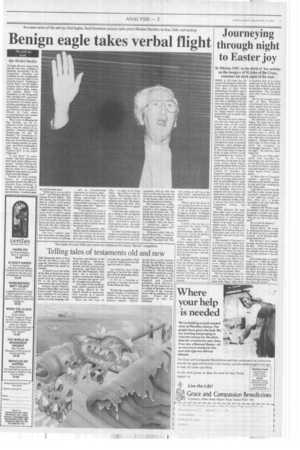
Report an error
Noticed an error on this page?If you've noticed an error in this article please click here to report it.
Tags
Share
Related articles
The Right Types
Close To Church's Clear Mission
Bishop Removes Peace Priest
Sin Has Laid Us Low. The Spirit Of The Risen
New Paperbacks
Benign eagle takes verbal flight
Me and my God Mgr Michael Buckley
TO begin this new series of Me and my God, then, a tableau of dazzling incongruity: in the foreground, puzzling and wrinkling at your corespondent across a worn bar-table in the traveller-frayed Paddington Station Hotel, sits the slightly stooping figure of Mgr Michael Buckley, priest, healer, author, and popular Radio Two broadcaster; in the background, fully occupied with a succession of swiftly-shifting colleagues and framed by two chunky gofers wielding portaphones the size of boxing gloves shifts the languid and Bambi-eyed figure of Sir Edward Du Cann, whose accomplishments must remain undisclosed by this column.
This is a way of affirming that Mgr Buckley, not the exchairman of the Conservative Party, was the subject of my attention. Formerly resident in Scarborough, he and "El Shaddai", his "community for inner healing" Mgr Buckley has been one of best-known priests with a healing ministry for many years have flown southwards to Bath, from a house called "Gallows Hill" to one called "Gallis Ash."
"It was there," he wrote recently, "that those sentenced to death under Justice Jeffreys were hanged. Gallows Hill has the same history. God is showing us that he wants us to continue healing for inner peace in a world which values life cheaply."
I Perhaps the most striking feature of contemporary spirituality has been the shift in its attention from suffering to healing. Intrigued by the tale of two houses, which seemed to raise the theme, I wondered aloud why this had taken place.
"Suffering is not an end in itself " said Michael Buckley, leaning forward slightly. (His soft, burring, jug-of-cream Irish delivery strikes a vivid contrast with his knarled, craggy looks he resembles a benign eagle and a slightly battered mien.) "Not an end in itself: in itself it means nothing. If it burdens people to such an extent that they're unable to be real people, full people, human and alive, and able to live life to the full, then I think that suffering is, as Mary Craig said, wasted suffering."
This view, I suspect, came from somewhere very deep inside him: the glorification of suffering
and an overwhelming impression of God as judge appears to be among the most lasting impressions of his childhood years. "I remember being terrified at the age of 14 by a sermon about hell." (Echoes, I thought, of James Joyce.)
"I had nightmares about it afterwards that had the result of making me frightened and scared, really, not only of God but also of authority and the church. It became a church of doom and not the church of hope."
Slowly and painfully, Mgr Buckley shed the stubborn skin of this view of God: his present, more open opinion, by contrast, has come to see him as a loving father or, rather, as our loving father who wishes to heal his people. Most people who are baptised are baptised into a religious community: this doesn't mean that they have faith. Faith is God's gift by which we respond to God's love for us.
"I think that many people who go to church or who are baptised into a religious group or a denominational church have no faith. And faith is when the illumination comes the stark reality hits home that God really loves you.
"So I don't care what popes or cardinals or archbishops or parish priests or laypeople or anybody says: I know from my own experience, from my faith, that there is a God who loves me, and that is the most important thing in my life because when I die that's the only thing that's everlasting."
This communicates, I think, some impression of Michael Buckley's wide-ranging, widerolling conversational style. His books His healing touch and Stories that heal develop this liberating view of God. (They do it, incidentally, with a fair degree of intellectual rigour: he specialised in philosophy while studying at Rome.) He became a priest "after the Second World War, I wanted to help people; I cared about people. I thought: "What shall I do? Will
be a doctor or will I go to the third world? I decided that the best thing I could do was to be a priest.
"What's sad in the church is that people have got to go to Lourdes to find inner peace when it can be found in London, Liverpool, or Leeds." To Michael Buckley, the church's main task is to communicate this tranquility to its members.
"I believe that we have to restructure the whole of the western concept of churchmanship, otherwise as like to say we're just shifting deckchairs on the Titanic."
"The issue isn't married priests, women priests, smaller parishes, collegiality. The church must preach the basic message Christ came to teach: his love of God, his love for man and also that God heals."
I glanced upwards, returning to the tableau. Sir Edward Du Cann was stifling slightly in his seat: his hands spread, palmupwards, in a gesture of resignation. I looked back at Mgr Michael Buckley, and found myself struck by the study in contrasts, the variety of human character.
blog comments powered by Disqus


